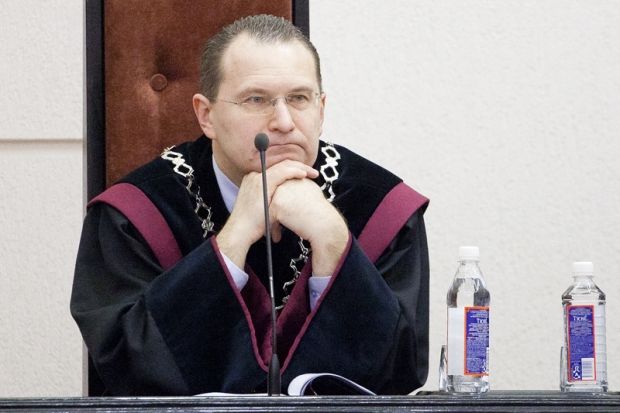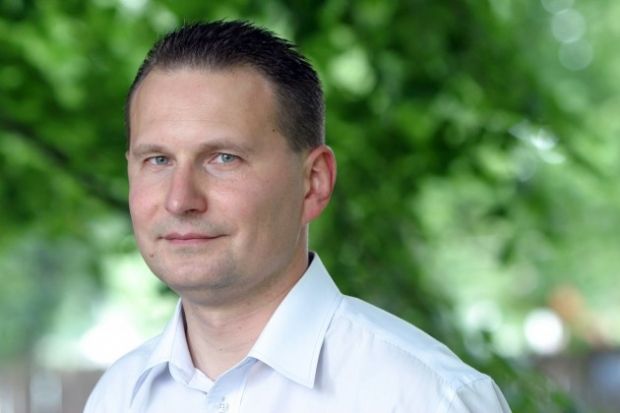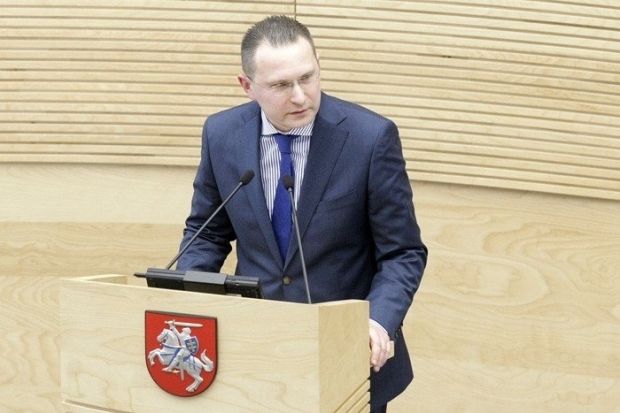
Head of Lithuanian Constitutional Court: "Russia’s Constitutional Court had the right to stop the annexation of Crimea"
Head of the Constitutional Court of Lithuania Dainius Žalimas has told UNIAN about the probability of exclusion of Russia’s Constitutional Court from the Conference of European Constitutional Courts for its ruling, allowing Russia to annex Crimea.
An expert in international law, Professor of Vilnius University, Dainius Žalimas was appointed head of the Constitutional Court of Lithuania in July 2014. Before that, he was involved in research projects of the EU and other international organizations related to human rights, democratization and legalization of the memory of the victims of totalitarian crimes. He also worked as a member of the Permanent Court of Arbitration in The Hague. Dainius Žalimas contributed greatly to the study of the international legal framework for the restoration of Lithuanian independence, and to Lithuania's integration into NATO. Žalimas was awarded a medal of the Lithuanian Riflemen's Union "Defenders of the Parliament" and a memorable sign of NATO.
In an interview with UNIAN the head of the Constitutional Court of Lithuania (CCL) told about the creation of the Association of Constitutional Justice in the Baltic and the Black Sea region, on the probability of exclusion of the Constitutional Court of the Russian Federation from the Conference of European Constitutional Courts for its ruling allowing Russia to annex Crimea; he also explained why the policy of European integration should be enshrined in the Constitution, and assessed Ukraine’s Constitutional reform.
In response to the ruling of the Constitutional Court of the Russian Federation (CCRF) on the recognition of the legitimacy of the referendum on Crimea’s accession to Russia, its results and procedure of accession Ukraine's Constitutional Court (CCU) terminated in April 2014 the Memorandum on the development of cooperation. Recently the CCU initiated the collection of signatures intending to condemn the actions of the CCRF. The CCL was among the first supporters of this initiative. What is its essence?
For the first time in the history the court, 19 judges, is complicit in the commission of an international crime - annexation of Crimea. The CCU’s initiative aims at condemning such actions of the CCRF and perhaps raise the issue in the future of CCRF’s membership in the European Conference of Constitutional Justice - the Conference of European Constitutional Courts [the Ukrainian side plans to add a corresponding declaration to the agenda of the Congress of the Conference of Constitutional Courts in June, 2017]. One of the requirements for the Conference’s membership is to adhere to the principle of the rule of law and be an independent court.

In our statement we used diplomatic language, saying that we have doubts (speaking of myself – I have no doubt) that the Court [the CCRF] is not governed by the rule of law. Its ruling [on Crimea] – is flawed from the very beginning, as it recognized Crimea subject of international law and even considered it [the treaty on accession of Crimea and Sevastopol to Russia] an international treaty. This is a gross violation, since, from the legal perspective, they had to state that Crimea is not a subject of international law, while the treaty cannot be deemed international.
Is this ruling tied to the fact that accepting a new federal subject is a Constitutional procedure?
The mechanism is as follows: for the State Duma to adopt a final bill on a new federal subject, it needs a positive conclusion from the CCRF. And this conclusion was positive. CCRF judges considered the issue very formally. In particular, with regard to recognition of the Treaty on Crimea’s Accession as international. That is, they saw that the [Russian] president [Vladimir Putin] had signed it, so it meant it was an international treaty. They saw no violations.
I'm not even taking into account international law - that there was aggression, there was the use of force, and there was no self-determination. There was a violent seizure of foreign territory. They did not see this at all!
Legally, the situation is such that there is still an international treaty between Ukraine and the Russian Federation on the state border, according to which Crimea belongs to Ukraine. The Russians wanted to denounce the treaty, there were such initiatives. But according to international law one can’t unilaterally denounce a border agreement due to the principle of inviolability of borders. And if we go back to the actions of the CCRF, it is clear that any independent court of a civilized democratic state would consider the essence of this issue [the treaty on Crimea’s accession], rather than fulfill someone’s political will.
The Constitutional Court of the Russian Federation fulfilled the political will. This is evidenced by an incredible pace of decision-making. The treaty was submitted for CCRF’s approval on March 18, 2014, and the judges have drafted the ruling overnight. But no court works like that! This suggests that it’s not a court, but a puppet of the political authorities.
We discussed this issue in Batumi at the Conference of European Constitutional Courts in September and had a sharp exchange of views. I quoted the chairman of the CCRF, who directly recognizes that the CCRF "proudly" fulfilled its mission. He said this saved the so-called people of Crimea from – let me remember his phrasing – “Islamic terrorists and Banderite fascists.” And this also shows “quality” of this court...
That is, it will be impossible in the future to write off such actions in the Constitutional Court, saying that the judges just erred, won’t it?
They deliberately committed a crime, this is my personal view. They are professionals and are well aware what it is. But their rhetoric is political. It shows that they are only tools.

Overall, I do not remember that the whole panel of CC’s judges participated in the commission of international crimes. “The court commits a crime” - it even sounds weird.
What other countries except Lithuania joined Ukraine’s initiative to condemn the actions of the CCRF?
So far we have seven signatures: besides Ukraine and Lithuania, there is Poland, Moldova, Georgia, Azerbaijan and Cyprus. In fact, it was an eye-opener for many, since everyone is talking about the annexation, but they don’t know any details.
Lets’s return to the process of Crimea’s accession to Russia… Could the CCRF stop this process?
If you look at this issue from a solely legal perspective, the CCRF had the right to stop the annexation of Crimea, had it issued a negative conclusion. And, technically, this [annexation of the Ukrainian peninsula] would not have happened. So, all subsequent deaths is on this people’s hands, because that’s how it all started.
Let's talk about Ukraine. Today we are in the process of amending the Constitution. In your opinion, is it possible to change the Basic Law so that we can protect ourselves from Russia’s possible actions in the future, for example, those regarding pseudo-referendums?
From a legal perspective the Ukrainian Constitution already has a provision, prohibiting encroachment on the territorial integrity of the country. This is sufficient for a legal defense. In addition, the CCU has issued all of the necessary rulings regarding the decisions of the so-called Crimean parliament on proclamation of the results of the referendum, etc. In addition, a decentralization is underway, as well as a judicial reform. It’s pleasing to see that it has been proposed to expand the jurisdiction of the Constitutional Court – it’s about introducing the concept of an "individual complaint," meaning any citizen could apply to the court...
But from the Lithuanian experience, in order to provide for the country’s stability, a principle can be enshrined in the Constitution of Ukraine’s geopolitical orientation – it worked for us.
Could you elaborate?
In Lithuania, there are two constitutional acts at the level of the Constitution. The first is about not joining the CIS and all similar Russian unions. The second goal (previously it was shaped in another form, and we have already implemented it) is membership in the European Union.
Ukraine is only striving to become member of the European Union...
Lithuania had this principle - the EU plus NATO. But this is the choice of Ukraine - European Union plus NATO, or the European Union only. In any case, if it is sealed at the constitutional level, it is much more difficult to change the orientation every five years, with every change of government. In Lithuania, it worked. Various authorities were coming and going (politicians were different, some more anti-Russian, others were sometimes called pro-Russian), but we stuck to one path. That’s because amending the Constitution is much more difficult than, say, change some concept of foreign policy or national security.
So I would advise you do it, and Ukraine, especially given you had already made your European choice. That would make Ukraine more stable and predictable. Besides, the Revolution of Dignity obliges you to do so, I believe.
In recent years people complained about the CCU. Is there a recipe for improving its efficiency?
Constitutional reform should contribute to it. As I said, there are a number of interesting proposals, individual complaints, for example, as I’ve said before. Also, the CCU’s deprival of what’s unnatural to it, like the interpretation of the law. Other courts should deal with it. One more thing is the establishment of time limits for consideration of cases... A lot of things.
The main thing - and we contribute to this – is for the CCU to feel a full member of the European community. In Vilnius we have just founded the Association of Constitutional Courts of Lithuania, Ukraine, Moldova and Georgia. We see positive changes for the CCU to become a truly European court. And, most importantly, it must be independent. Independent of any authorities. It’s important that the authorities, whatever may come, not take over the old methods of influence on the Court. Then, I think, the situation will change by itself. The situation is already changing.

